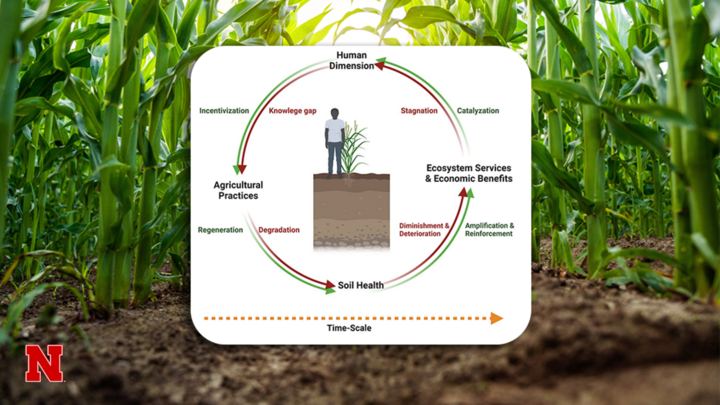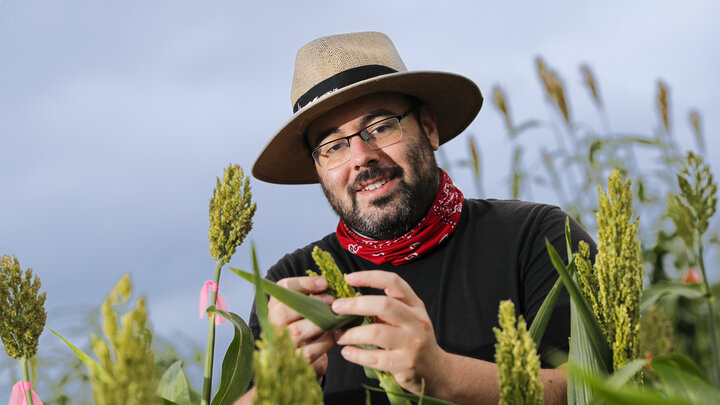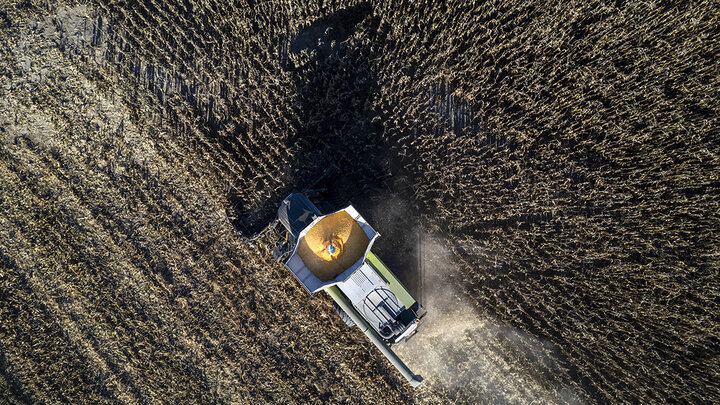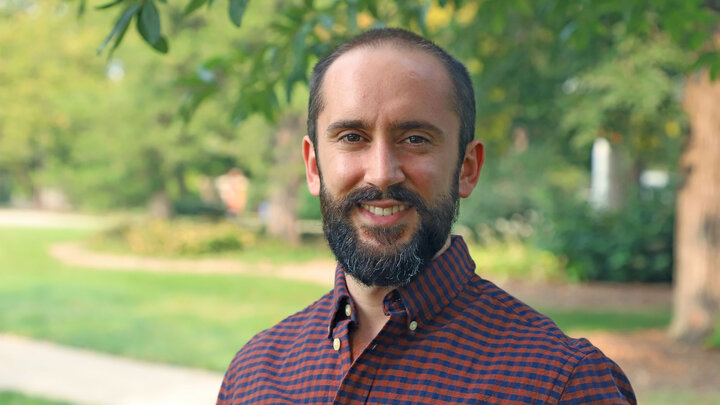Don Lee, plant breeding, genetics and molecular physiology professor in the Department of Agronomy and Horticulture, retires Oct. 10 after a 36-year career at the University of Nebraska-Lincoln.
A reception in his honor will be held from 2 to 4 p.m. Oct. 10 in the Goodding Learning Center in Plant Sciences Hall. Cake and refreshments will be served. Colleagues may sign the online guestbook.
...
Six months after applying for a teaching position, Don Lee got the call: he was selected for an interview. But he and his wife were expecting a newborn in two weeks. The day before his flight to Lincoln for his interview, his son, Sam, was born. He left for his interview on an adrenaline high and the University of Nebraska-Lincoln offered him the job at the end of the week, culminating in the best week of Lee’s life.
Lee said the worst week of his life came soon after with the start of the 1989 fall semester. He quickly found out that he was unprepared for the stress of being a genetics professor. Lee remembers how difficult the first semester was, not only because he felt unprepared to be an educator, but also because he was trying to incorporate molecular genetics into the curriculum, an area in which he had extensive experience.
“I would never want to go through that first semester of teaching again,” Lee said. “And whenever I met one of my former students who had me as a teacher that first semester, I always felt like I should apologize to them, because it's hard to be a good teacher. And I wasn't a very good teacher to start, to be honest.”
David McGill, the previous instructor for the course, left Lee with a notebook outlining everything he taught and why, file cabinets full of original genetics exam questions, four teaching assistants and the advice that he should immerse himself in his students’ community.
“It makes all the difference in the world,” Lee said. “If you can call on somebody by name, it just kind of breaks down a lot of barriers and engages them in what's going on in the classroom.”
With the tools McGill provided and dozens of semesters of experience, Lee became a standout educator. Throughout his tenure at Nebraska, Lee was recognized by students, parents and colleagues for his dedication to students and excellence as an instructor and student adviser.
“I’ve always been impressed by Don’s energy and passion for teaching and working with students,” Samuel Wortman, one of Lee’s colleagues, said. “He loves learning about the students and their professional interests so he can best help them achieve their goals. Because of this passion, Don was always developing and taking on new courses and programs to better serve our students, and he was great at building teaching teams to help meet the student demand for the courses he built.”
Lee was recognized by the University of Nebraska Teaching Council Parents Association for outstanding service to students over 25 times. He earned the Nebraska Agricultural Youth Institute’s Award of Merit in 2008 for serving as a role model for future agriculturalists, as well as the American Society of Agronomy’s Agronomic Resident Education Award in 2004. Lee is a two-time winner of CASNR’s Outstanding Teaching Award, and recipient of the college’s Crop Science Teaching Award and Distinguished Teaching Award.
George Graef, Nebraska Soybean Producers Presidential Chair of Soybean Breeding and professor of agronomy and horticulture, reflected fondly on his time teaching beside Lee.
“Don Lee has positively impacted so many students and colleagues during his career at UNL,” Graef said. “It’s been a pleasure working with Don through the years. I particularly enjoyed teaching the undergraduate plant breeding class together; his enthusiasm for teaching, and joy in seeing students succeed, is contagious and motivating.
In the late 90s, Lee earned the Dean’s Special Recognition Award for his new advising format, the Student Foundation/Builders Award for Outstanding Advising and the L. K. Crowe Outstanding Undergraduate Student Adviser Award.
“One of the things I appreciate about Don is his focus on students,” Leah Sandall, Lee’s colleague and former student, said. “I can recall observing this quality when I met him as my undergraduate adviser. He cares about students having valuable experiences, both in the classroom and work experiences. He connected me with my first on-campus job in a genetic engineering lab, and I've seen him network and make connections for countless students over the years.”
Though he is leaving behind a powerful legacy as a beloved educator at Nebraska, Lee did not always envision himself as one — he wanted to be a plant breeder when he was young, even though he had never met one.
“It just sounded interesting that you could create some new genetic combination in a plant that would be desirable for a farmer to grow,” he said.
Lee started his bachelor’s in biology at Montana State University in 1976, but transferred to Augustana College in his hometown, Sioux Falls, South Dakota, after one semester. After graduating in 1981, Lee decided to go to graduate school, not entirely knowing what was in store for him, but certain that he needed to learn a lot more than he already knew if he wanted to become a plant breeder. He started his master’s at South Dakota State University in 1982, where he learned from spring wheat breeder Fred Cholick.
“Fred knew I didn't know much about farming and didn't have much practical field experience,” Lee said. “But I was curious and I wanted to learn, so he took me on as a grad student.”
Lee worked with Cholick for two years, doing most of his learning in the field alongside him, developing new varieties of spring wheat for farmers to grow in South Dakota and observing how Cholick interacted with farmers during field days.
“But along the way, I decided I don't think I'm patient enough to be a plant breeder,” Lee said. “Plant breeders don't really see if they're successful for 10 years and I was learning a little bit more about discoveries about genes, how genes work and how the genes can influence the traits that living things have. So I decided I wanted to have a PhD program that gave me a chance to work more at the gene level.”
Lee got a doctoral assistantship at Montana State University with Tom Blake, a barley breeder. He looked at differences in plants at the DNA sequence level in Blake’s Restriction Fragment Length Polymorphism Analysis of Plants lab, and one of his significant projects was analyzing the differences in the genes of chloroplasts in alfalfa. Lee formed a network with international students, held a managerial role in the lab and became a better scientific thinker and writer while gaining field experience.
“I discovered more about plant breeding,” Lee said. “I discovered more about how molecular genetic data could be used by plant breeders to ask questions and help them make decisions. And the normal sequence was to go on to a postdoc.”
He accepted a postdoctoral position at the University of Minnesota and worked with an oat geneticist and an oat breeder with the United States Department of Agriculture. He formed connections with graduate and postdoctoral students, and one of these connections told him about the lecture job at Nebraska that marked the start of his career as a professor.
“As a teaching assistant, I always had a lot of fun helping students learn,” Lee said. “I never really had any experience teaching genetics, but whenever I learned something new in genetics, I always asked myself, how would I teach this to somebody else? So I knew I had the teaching phenotype; the interest in being a teacher.”
Since he began at Nebraska in 1989, Lee has taught 14 different courses, nine of which he developed or co-developed, including genetics, which he taught for 75 semesters.
“I like the application of science to real-world problems, and that's what we are,” Lee said. “We're a problem-solving department, just like animal science is or entomology is. And so it's been a really good combination. I like to see what new discoveries are happening, but then I like to envision how they can be used to solve problems and then help my students see that potential connection. You're not just learning this for the test, you're learning this because this could actually be something you'll work with or benefit from down the road.”
According to Lee, the soybean management field day was the most fun teaching experience he ever participated in. They travelled to small Nebraska towns like they “were delivering a three-ring circus,” setting up and taking down tents as they went. Though he recalls how exhausting the process was, he reflects fondly on the connections he formed with his colleagues.
“We felt like a team, and it was really a lot of fun,” Lee said. “And so our extension people do a lot of that, and that event still continues on. That was unique. It was an experience where I really saw the value of the interdepartmental and interdisciplinary thinking and learning that has to go into crop production and I still have good memories of it today.”
Lee's passion for teaching formed a desire to improve educational resources for his students using modern technology. Though he started his position with physical slides, an overhead projector and a chalkboard, technology advancements in the mid-90s changed his job. His goal became creating more visual resources that are electronically delivered to students. He had big plans to create teaching resources customized to his course and his students’ needs.
“Teaching is great because it gives you this platform for investing your creativity,” Lee said. “Kind of like a musician, right? A musician can write songs, but I'm sure they're more motivated if they know that somebody's going to listen to them. And so to me, it's much the same. But being able to have a platform where people can access what you create, expands your teaching impact. And rather than creating a textbook that ends up on a shelf, I just felt like the internet was a platform that so much of the public could access.
Lee worked with his grad student, Patty Heim, to create an online curriculum with lots of visuals and flash animations. Heim developed nine lessons on the crop genetic engineering process and through a grant from the American Distance Education Consortium, she and Lee added them to the newly created Crop Technology Library. That resource is now called the Plant and Soil Sciences eLibrary and has since expanded to 150 lessons.
“One of the biggest accomplishments that I would say I was a part of is developing this collective of great learning resources that still helps people learn today,” Lee said.
Lee’s embrace of technology led to even more recognition. In 2009, he earned the Outstanding Teaching and Instructional Creativity Award, a University of Nebraska system-wide honor. His embrace of distance education and computerized flash animation was a huge part of his nomination. In 2002, his website, “Croptechnology: An Open Website for Lesson Modules in Crop Science” was selected for an award from the ASA Division A-4 Extension Education Awards Program.
But Lee’s work as an educator and a lifelong learner is not over. Lee says he wants to keep learning and creating resources for the Plant and Soil Sciences eLibrary in his retirement so he can continue to educate students with dynamic, digital learning resources.
Lee also plans to spend more time outdoors in his retirement — fishing, hiking and traveling with his wife, Becky. He expects he and Becky will travel east to Portland, Maine, often to visit their two children who live there.
“I'll try to stay in shape so I can keep propelling myself around,” Lee said. “Maybe in the mountains, it would be a good reason to get back to the mountains.”




